This section aims to show how Nottingham and Nottinghamshire have made contributions to LGBT history which are far greater than their population would suggest
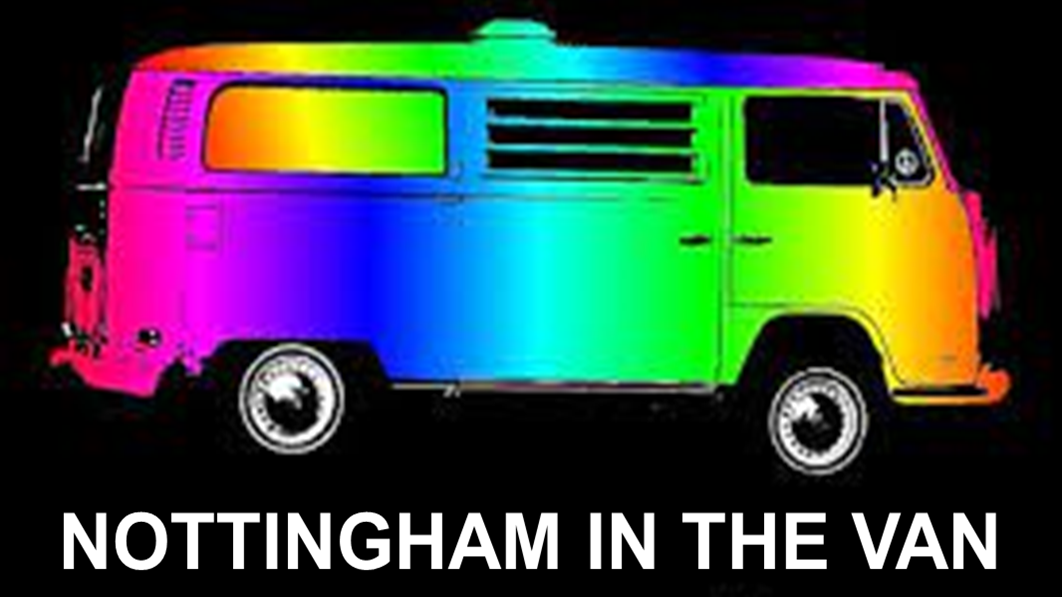
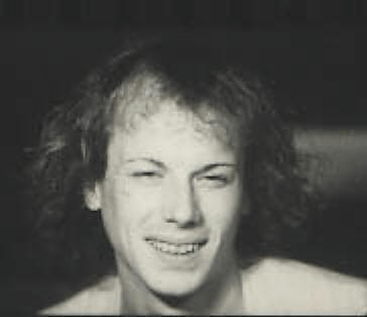
After the Stonewall Riots in 1969 New York, the Gay Liberation Front took off in the USA.
Nottingham born Bob Mellors was in the USA at that time. When he returned to the UK, he was the person responsible to starting the UK's Gay Liberation Front.
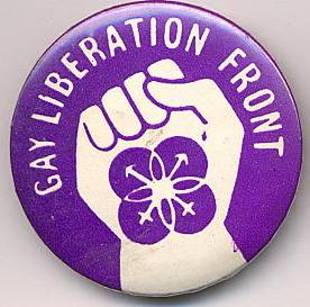
La Chic, on Canal Street, was not the first gay club in Nottingham. It opened in 1973, but It was the first club in the UK which had a licence stating that "This club is for lesbians and gay men". It made headlines in Nottingham Evening Post - see right.
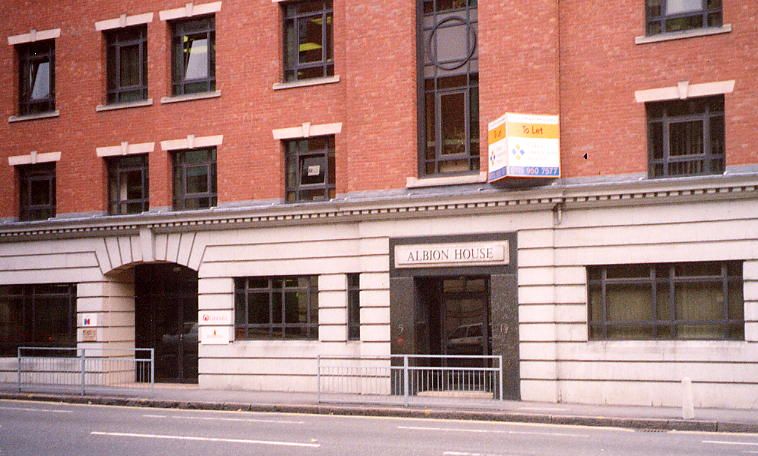
The letters column of the Post was populated with comments such as
I was amazed and disgusted to hear that £40,000 is to be spent on a club for "gay people". What on earth is happening to the world? Surely woman was made for man? The idea of men kissing and dancing together makes me sick - the same with women. In my opinion, such people ought to be put on a desert island, given picks and shovels and made to cultivate it.
and
God rained fire and brimstone upon Sodom because of its people's manifest pleasures in such malpractice.
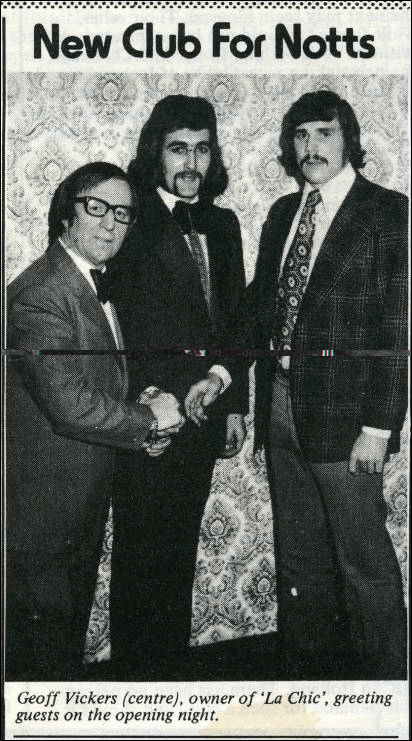
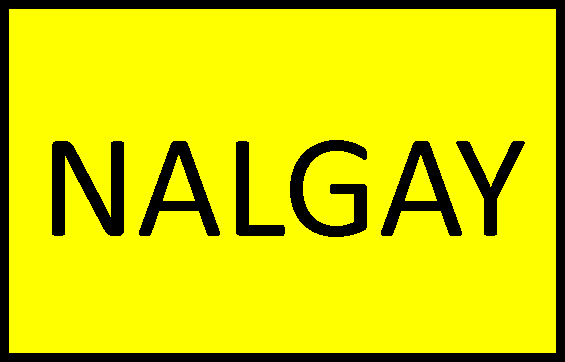
The first UK Trade Union LGBT support group NALGAY started in Nottingham.
n 1974, Howard Hyman, a member of NALGO Nottingham Health branch and Nottingham CHE (the Campaign for Homosexual Equality), attended the first conference by the Campaign for Homosexual Equality on workplace rights for lesbians and gay men. Afterwards, he wrote to the NALGO’s magazine, Public Service, suggesting a NALGO gay group, saying ‘I can’t believe I am the only one...’ Howard remained an important part of the group in its early years and he published that first Nalgay newsletter in October 1974.
Nottingham was one of the first cities to set up an LGBT helpline. From small beginnings in 1974, it acquired a phone line in 1975 and became first Nottingham Gay Switchboard, then Nottingham Lesbian and Gay Switchboard and is now Notts LGBT+ Network.
In the 1970s these helplines proliferated, but in recent years many have closed. The Nottingham service is going stronger than ever and the helpline operates by phone, e-mail, text, instant messaging and a presence on social media. The service has also produced its bimonthly newsletter QB since 1998. Click HERE for details. In addition, the Network can provide training, maintains a comprehensive LGBT database and enters into liaison with many local organisations - all this is done entirely by volunteers.
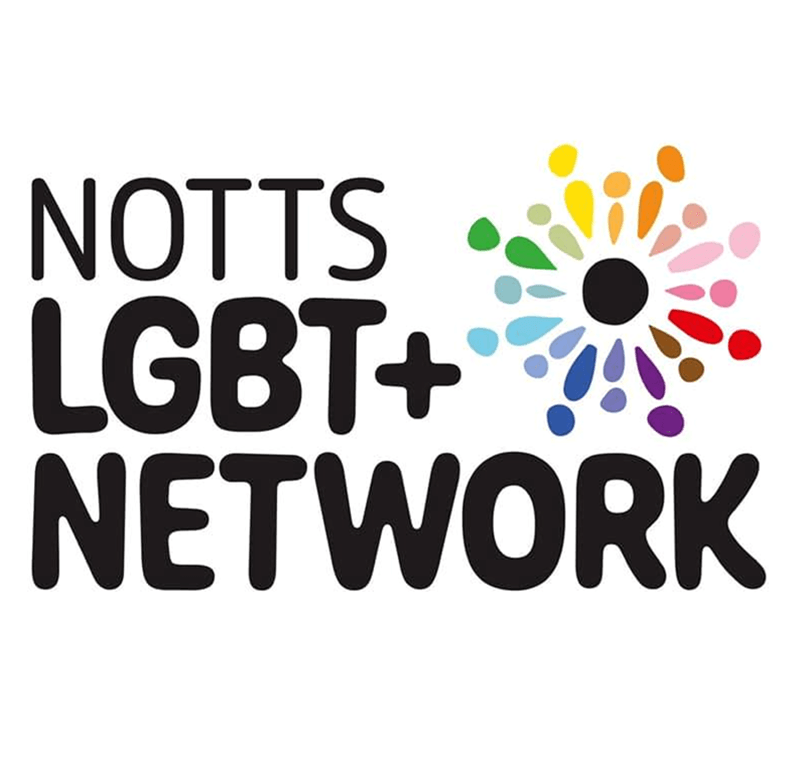
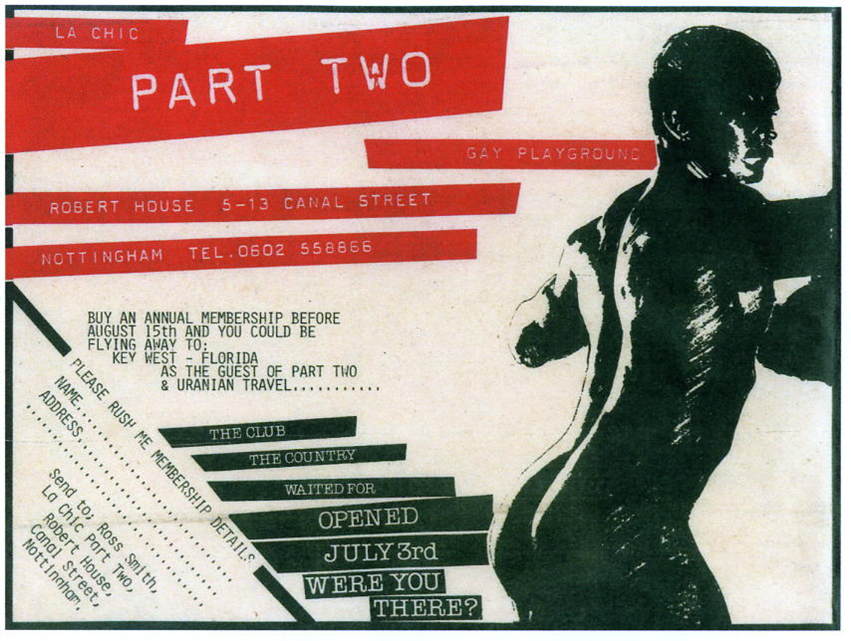
La Chic club closed in 1977, but was reincarnated in 1981 as Part Two under the management of Ross Smith.
For the first two years of its life, it was often described as the best gay club in the country. It was visited by many famous guests: Eartha Kitt, Imelda Staunton, Divine, John Curry, Justin Fashanu and the casts of various shows at the Theatre Royal.
To hear Ross Smith talking about Part Two on Radio Trent, click HERE
The first widely distributed lesbian and/or gay magazine which came from this area was GEM - Gay East Midlands.
Produced in Nottingham, by a team of volunteers from 1983 to 1984, GEM was established in response to a number of events, including the collapse of Gay News, Britain’s only gay and lesbian publication at that time and the onset of the AIDS crisis.
Whilst the original target audience was gay men and lesbians in the East Midlands, in the absence of a national gay mag such as Gay News, GEM’s circulation quickly spread as far afield as London and Edinburgh.
It ran to 9 editions. All editions can be downloaded from the "Local LGBT Publications" section on this website.
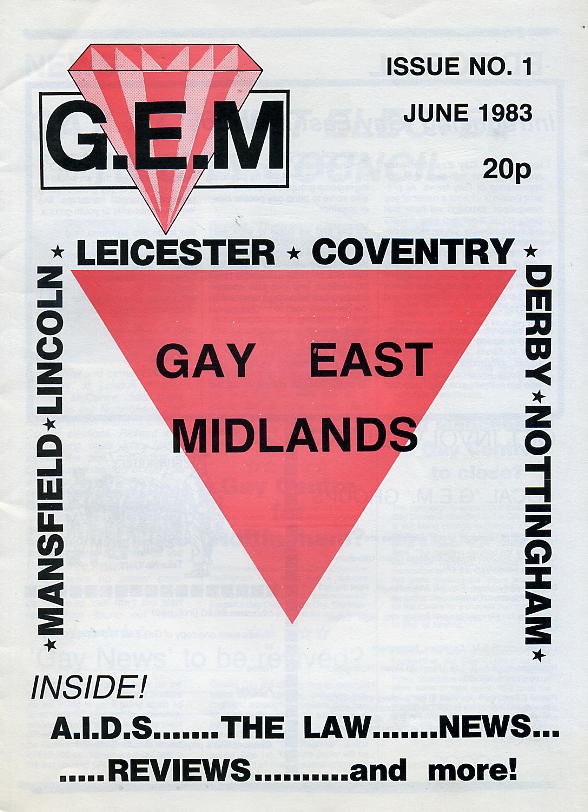
For all his talent, Justin Fashanu is chiefly remembered for two things: firstly, for being the world’s first openly gay professional footballer; and secondly, for committing suicide, whilst facing sexual assault charges in America. There is no doubt that the pressures and prejudices Justin experienced as a gay black man in the harsh world of professional football contributed significantly to his downfall.
In 1981, Justin became Britain’s first black £1 million player when he joined Nottingham Forest, managed by Brian Clough. The move was a disaster. Clough took exception to Justin’s style, spirituality and sexuality, famously confronting him at the training ground:
Why do you keep going to that bloody poofs’ club?
Clough banned Justin from the club, but the Football League ruled that there was no evidence supporting the suspension and Justin returned to training, to find that he still was not wanted.
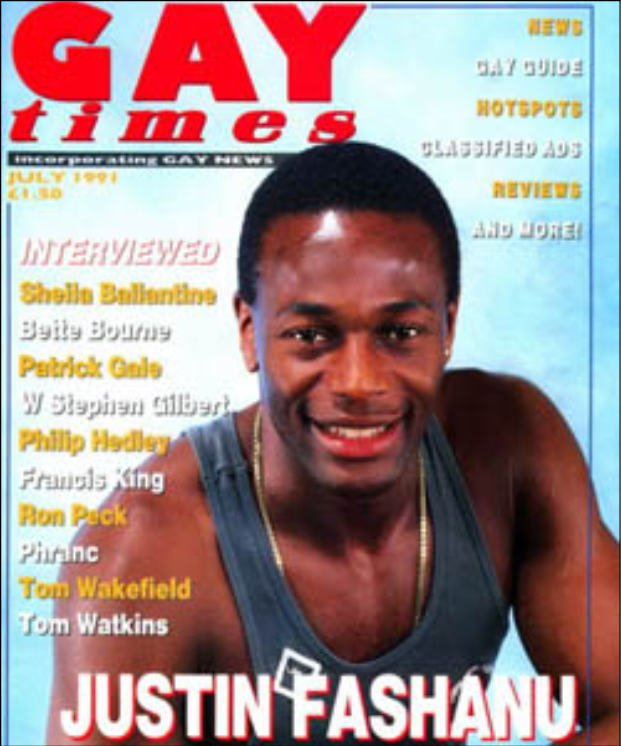
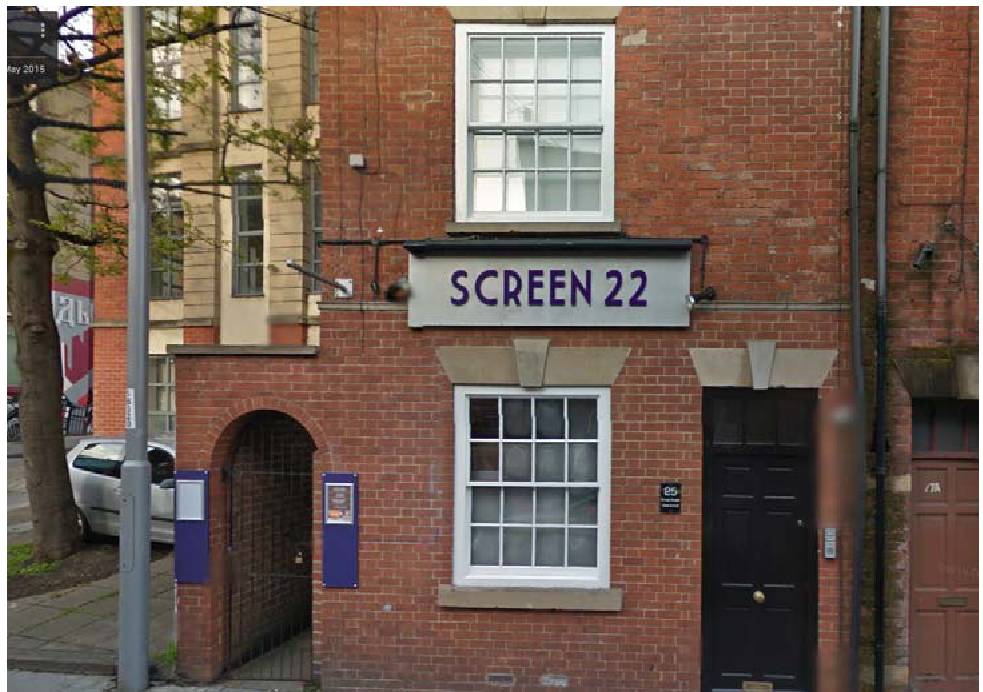
In the 1990s the Gallery Cinema on Broad Street had a reputation as a gay cinema. It later changed its name to Screen 22.
The name explains itself when it is revealed that Screen 22 has just 22 seats and is the smallest digital recognised single screen cinema in the World.
In 1998, Greg Woods was appointed Professor of Gay and Lesbian Studies at Nottingham Trent University.
His was the first such post in the UK. He is a critically acclaimed writer, poet and historian. The British National Party saw the appointment as a further sign of national decline. In the Sunday Mirror the Tory shadow Home Secretary Anne Widdecombe called Woods’ career “a phenomenal waste of public money”.
In the same year, Yale University Press published Professor Woods’ monumental History of Gay Literature, the first book of its kind.

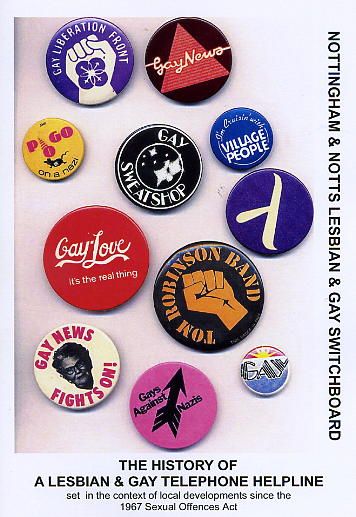
In 2000, Nottinghamshire Living History Archives financed 90 local history projects. David Edgley, from Nottingham Switchboard, was awarded a project.
One of the outcomes of that project was a book on Nottingham's lesbian and gay history since 1967. It uses Switchboard and the organisations which preceded it as threads which tie the story together. The project also included 20 interviews with local LGBT people aged from 25 to 85 as well as a large number of photographs, many of which are used on this site.
The book's cover was simply a scanning of a set of badges owned by Roger Hollier.
The book is one of the few which look at LGBT events and history outside London and the additional "usual suspects" - Manchester and Brighton. To download the book, click HERE
In March 2005 Nottingham Lesbian and Gay Switchboard (with invaluable help from Shirley Macredie) organised two conferences on "LGBT issues in BME Communities". These were, as far as we know, the first conferences of their type to be held in the UK.
About 60 people attended either as individuals or as representatives of a wide range of organisations
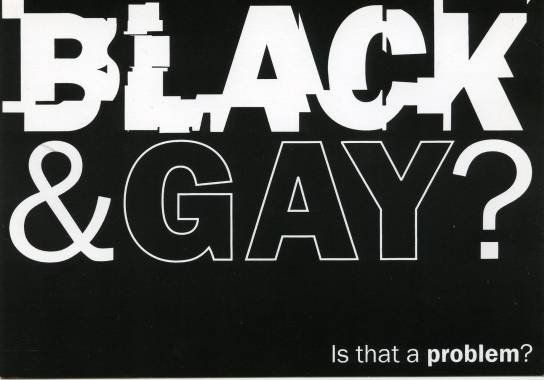
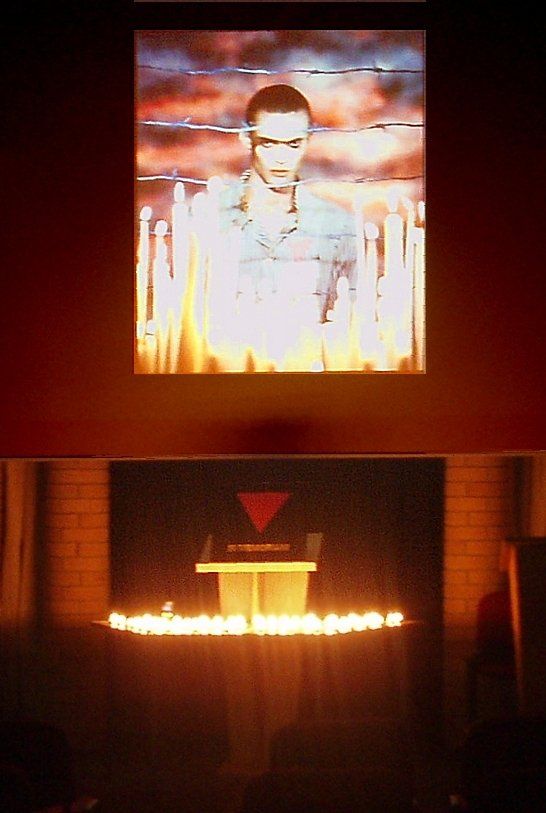
On September 22nd 2005, a ceremony was held at the Holocaust Centre at Laxton. The purpose of the ceremony was to celebrate the donation of an LGBT memorial plaque to the Holocaust centre and, at the same time, to remember the LGBT people who were murdered in the Holocaust.
About 45 people assembled to hear readings from the book “The men with the pink triangle”, by Heinz Heger. The ceremony ended with candles being lit by everyone present while the names were read out of countries where homosexuality is still punished by imprisonment or the death penalty; it was a long list.
The plaque is a simple square, bearing a pink triangle and the words “In Memoriam”. It now rests in the Centre's Memorial Garden.
Thanks must go to the North Notts LGB Development Group, and particularly to Mike Newstead of Bassetlaw CVS, for raising funds for the plaque and for organising the event.
There are only about 8 such memorials across the world and this is the only one in the UK.
In 2007, Nottingham City Council put together an anti-homophobic bullying pack which was sent to all City schools, colleges and youth groups.
In 2008, after several years of talks, they managed to persuade Nottingham Forest to lend their name and their players' pictures to an anti-homophobic bullying poster.
No other UK football club has - so far - been as upfront and taken action individually, rather than as part of a group of teams.
As Forest was Justin Fashanu's team, this was particularly apposite. As this did not happen in London, the London gay media ignored it
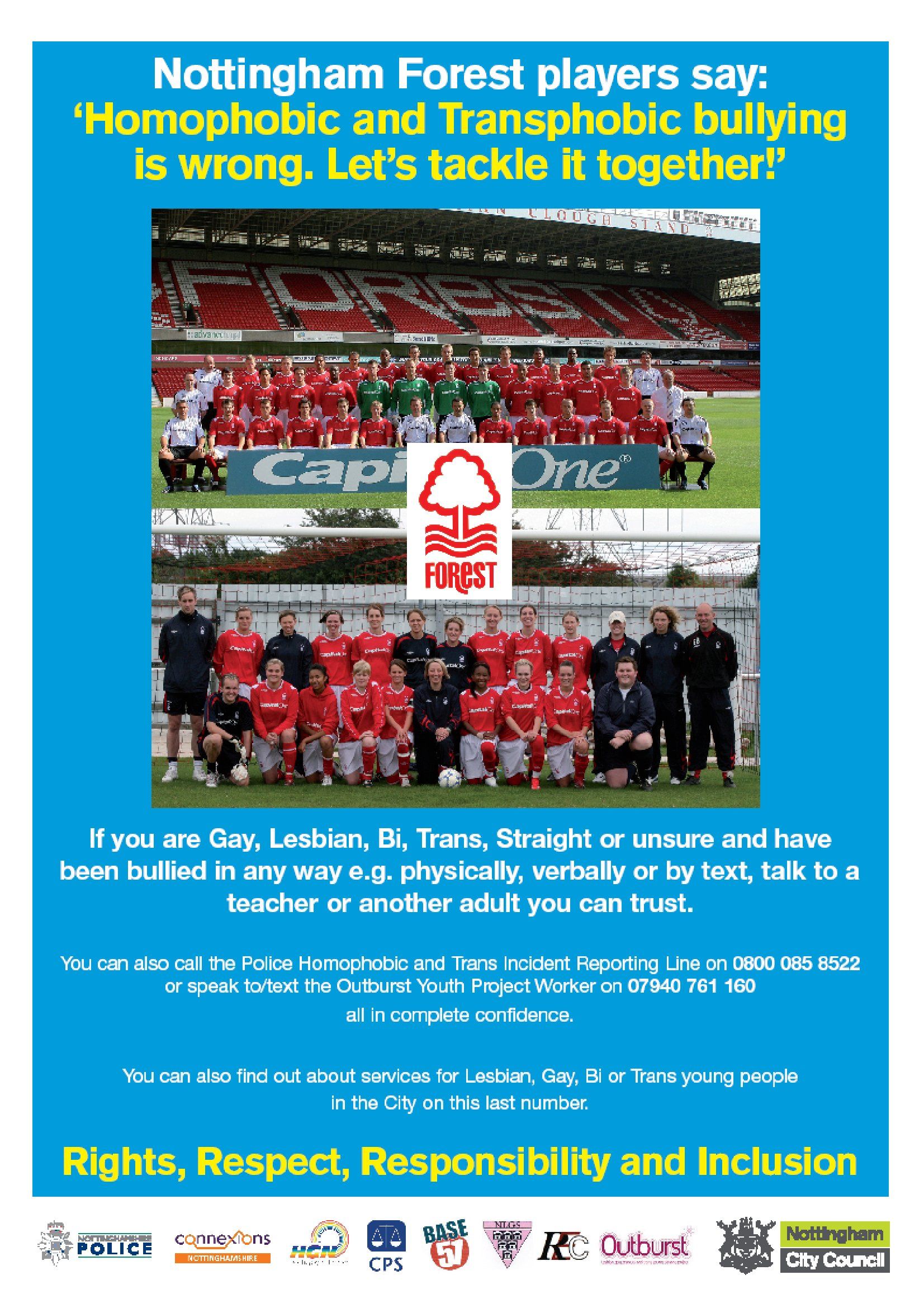
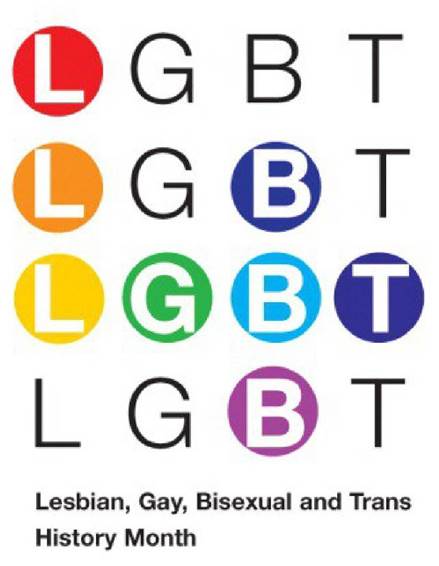
When LGBT History Month started in the UK in 2005, Nottingham was involved at the beginning.
The national organisers set up a website to provide support and ideas and also to show what was going on around the country.
Part of the website showed a map and if you clicked on a section of the map, it indicated what was happening in that area.
In 2011 and 2012, the area with the second greatest number of events was London.
Nottingham was first.
Early in January 2015 the news came out that Nottinghamshire Healthcare NHS Trust had become the number 1 employer on the Stonewall index.
This, to a large extent, was due to the untiring efforts of their Head of Equality and Diversity, Catherine Conchar - shown below with others (at the right of the rainbow flag) on the steps of their HQ.
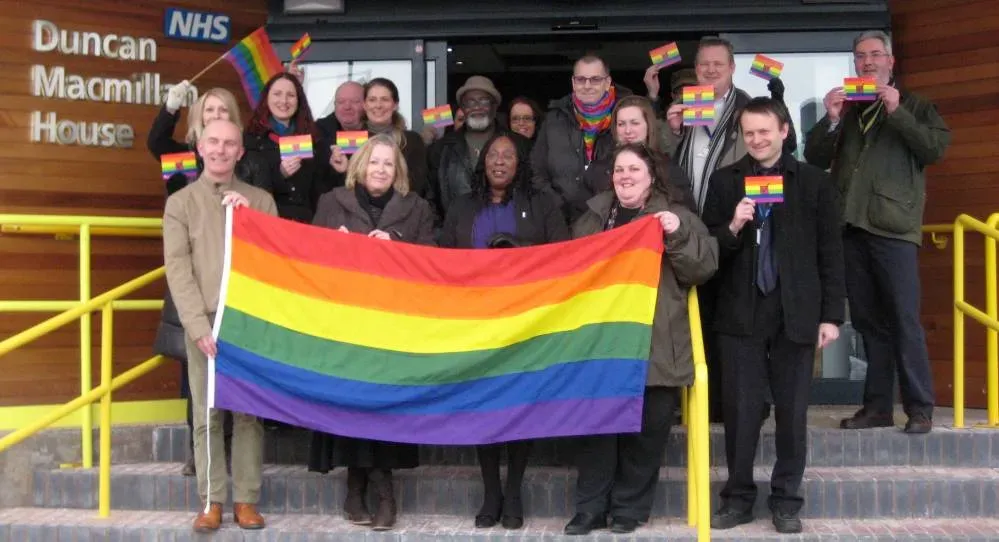
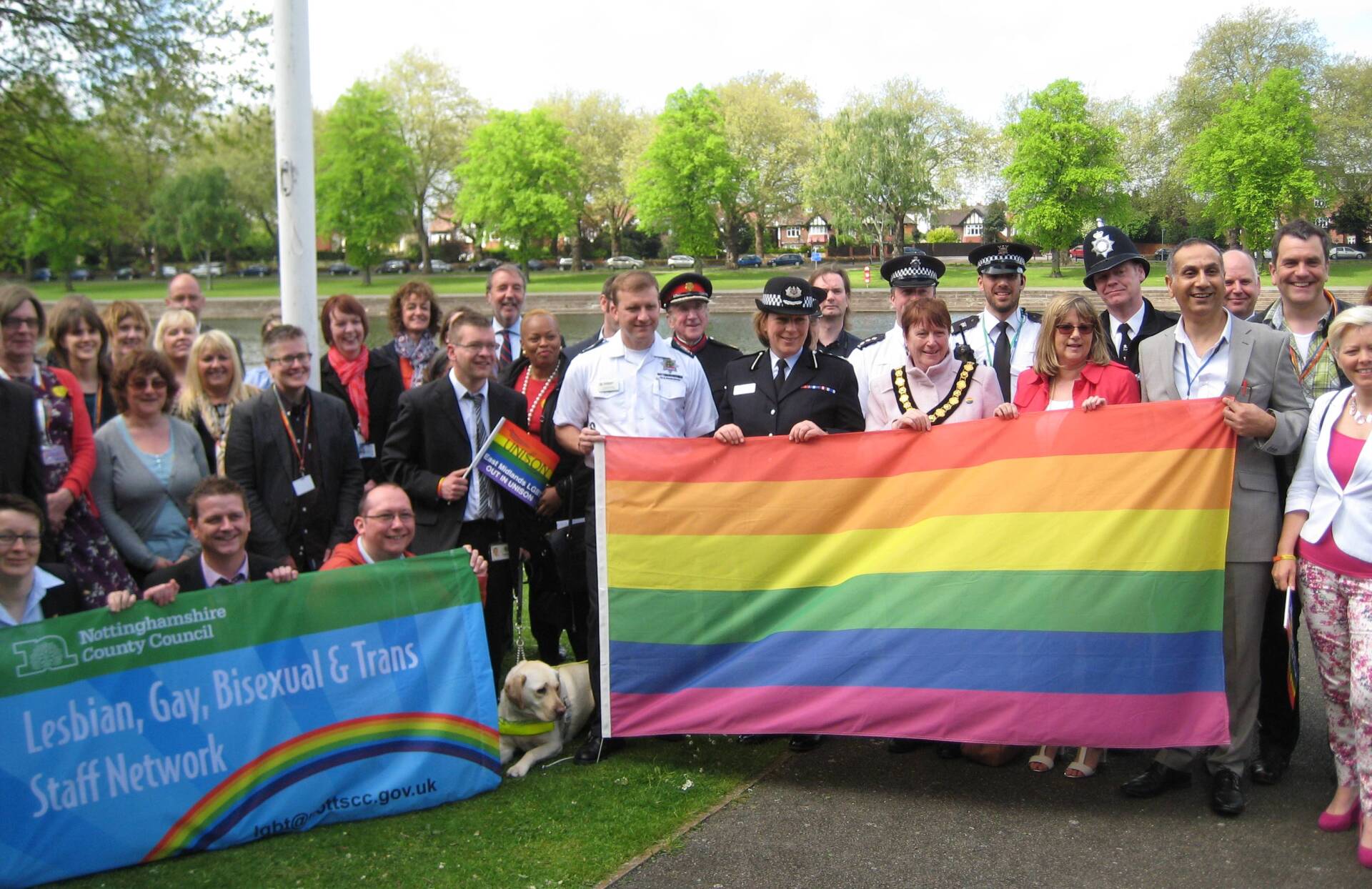
New Paragraph
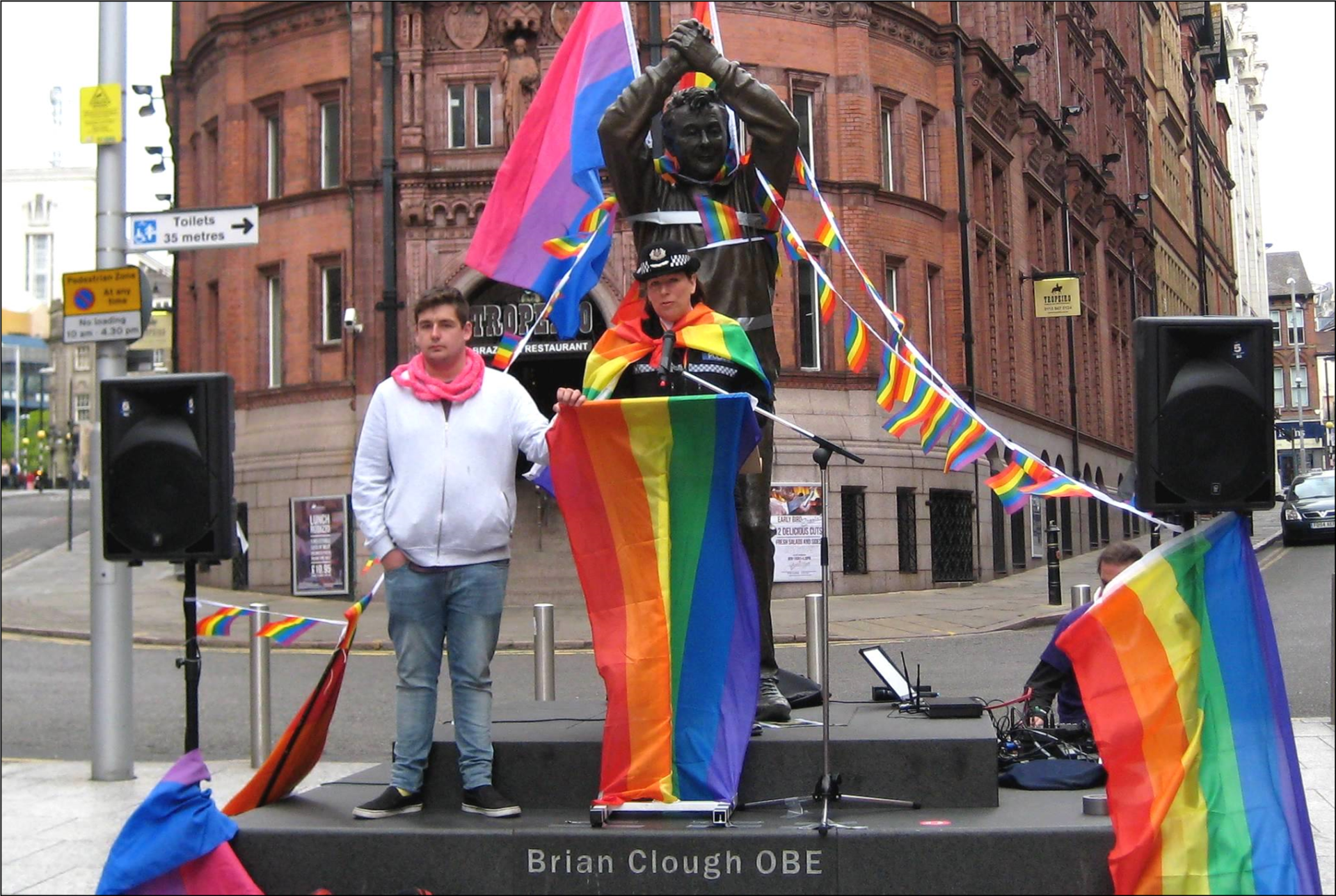
In 2015, IDAHO/IDAHOBIT day turned into week.
It kicked off with a flag raising ceremony at County Hall. Present were Sue Fish (Deputy Chief Constable), The Chair of the County Council, The Police and Crime Commissioner (Paddy Tipping) and members of most local LGBT groups and organisations.
Rainbow flags were coordinated to be raised at numerous sites across the County: police stations, fire stations, council premises and various individual companies.
Another event involved 5 groups of people streaming towards the Brian Clough statue from different locations.
Several short speeches were given, including one by Deputy Chief Constable Sue Fish, pictured standing in front of the rainbow-bedecked and homophobic Clough.
At Trent Bridge, Nottinghamshire Cricket Club showed the IDAHO Day flag on their big screen.
The International IDAHO Day organisation said that there were more activities in Nottinghamshire than anywhere else in the UK. They went on to say that there were entire continents which were doing less than Nottinghamshire.
In August 2019, the BBC announced that the UK's first rainbow crossing had been set up in Lambeth.
Londoncentricity prevented them from mentioning that Nottingham had beaten them by one month.
Four rainbow crossings were established in Hockley - three on Broad Street and one on Goosegate. These were followed later by rainbow crossings on the campus of the University of Nottingham and on the site of Kings Mill Hospital.
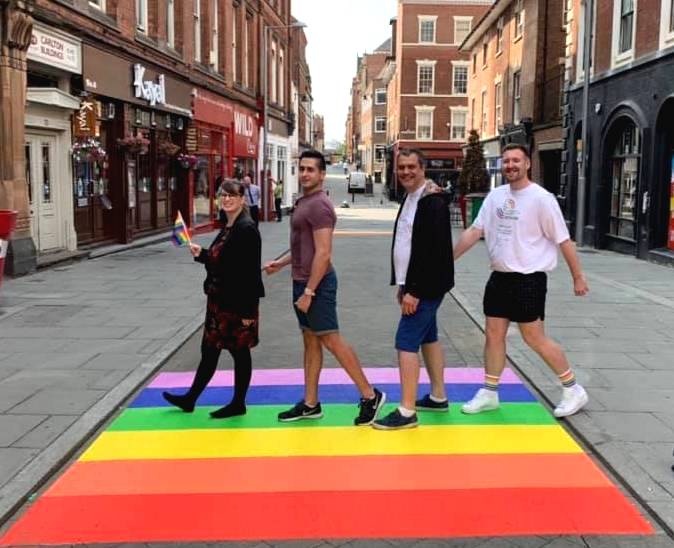
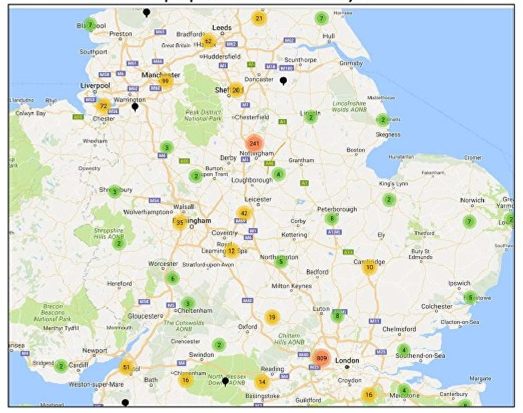
Pride of Place is the national LGBT map.
Nottingham and Nottinghamshire have over 240 pinpoints on the map, far more than any other place per head of the population.
Click HERE to open up the Pride of Place website. Scroll down to the map. If you click on the map (which may start with the whole of Europe), it will expand. The more you click, the more it will expand, until eventually you will see individual points of LGBT interest in Nottinghamshire. Each pinpoint will give you a picture along with information about that point.
To read local historian Tony Scupham-Bilton's collections of Nottinghamshire LGBT history sheets, click on the links below